a&e features
Newsom pardons LGBTQ and Black icon Rustin, stained by ‘historic homophobia’
‘Laws have been used as legal tools of oppression’
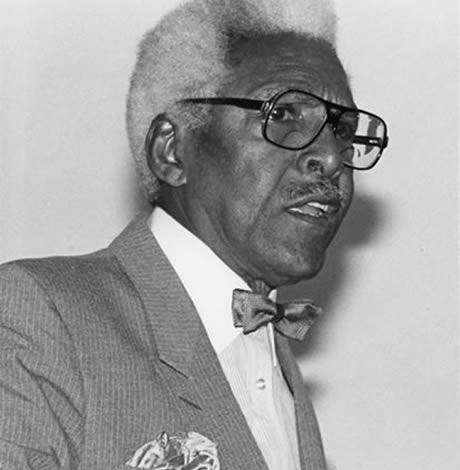
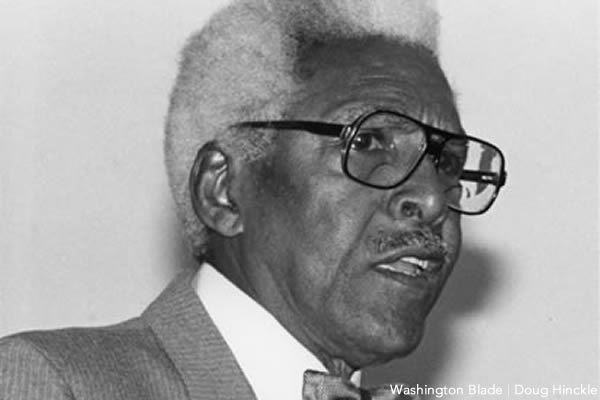
It was a patch of blue in the dark storm stalled over the divided states of America. On Feb. 5, California Gov. Gavin Newsom parted the pall and pardoned Bayard Rustin, mentor to Rev. Martin Luther King Jr. and chief organizer of the 1963 March on Washington. Though President Barack Obama posthumously awarded Rustin the Medal of Freedom in 2013, the gay civil rights icon still had the stain of a 1953 “morals charge” arrest in Pasadena on his lifetime of achievement.
“In California and across the country, many laws have been used as legal tools of oppression, and to stigmatize and punish LGBTQ people and communities and warn others what harm could await them for living authentically,” Newsom said in a statement. “I thank those who advocated for Bayard Rustin’s pardon, and I want to encourage others in similar situations to seek a pardon to right this egregious wrong.”
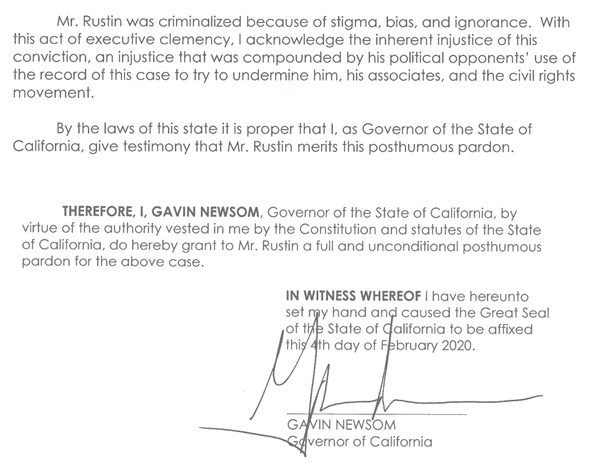
Excerpt of the pardon certificate
Rustin’s pardon launches a new clemency initiative for people who were prosecuted in California for being gay. In 1970, after the Stonewall riots and the movement for Gay Liberation, Assemblymember Willie Brown introduced the Consenting Adult Sex Bill to repeal the sodomy law and decriminalize gay sex. Five years later, with help from San Francisco Mayor George Moscone, the bill was finally passed and signed into law by Gov. Jerry Brown on May 12, 1975. But those convicted of engaging in consensual adult sexual conduct remained on the Sex Offender Registry until 1997, when a new law established a process enabling individuals to request removal. However, the original criminal conviction remained.
Newsom’s announcement acknowledges the systemic persecution of LGBTQ people and offers legal reparation.
“In California and across the country, charges like vagrancy, loitering, and sodomy have been used to unjustly target [LGBTQ] people. Law enforcement and prosecutors specifically targeted LGBTQ individuals, communities and community spaces for criminal prosecution. Now, as a proudly LGBTQ-allied state, California is turning the page on historic wrongs,” says the press release.
“There’s a cloud hanging over him because of this unfair, discriminatory conviction, a conviction that never should have happened, a conviction that happened only because he was a gay man,” state Sen. Scott Wiener, chair of California’s legislative LGBTQ caucus said Jan. 21 at a news conference with Assemblymember Shirley Weber, chair of the state’s Legislative Black Caucus, formally asking for a pardon.
“I’m thrilled that Governor Newsom is pardoning Bayard Rustin and that he acted so quickly and decisively in response to our request. I also applaud the Governor for broadening this work to provide other criminalized LGBT people with a path to clear their records of wrongful convictions on homophobic charges. These actions are consistent with the Governor’s deep and longstanding support for the LGBT community,” Wiener said in a statement. “Generations of LGBT people – including countless gay men – were branded criminals and sex offenders simply because they had consensual sex. This was often life-ruining, and many languished on the sex offender registry for decades. The Governor’s actions today are a huge step forward in our community’s ongoing quest for full acceptance and justice.”
“On behalf of the Black Caucus, I want to thank the Governor for granting this posthumous pardon. The Arc of Justice is long, but it took nearly 70 years for Bayard Rustin to have his legacy in the Civil Rights movement uncompromised by this incident. Rustin was a great American who was both gay and black at a time when the sheer fact of being either or both could land you in jail,” said Weber. “This pardon assures his place in history and the Governor’s ongoing commitment to addressing similar convictions shows that California is finally addressing a great injustice.”
“Civil rights champion Dr. Martin Luther King, Jr. said, ‘The time is always right to do what is right.’ For our friend Governor Newsom, that time is today. We are grateful to the governor for demonstrating our California values by pardoning civil rights hero, Bayard Rustin — a trusted aide to Dr. King — and for creating a system for other LGBTQ+ people to seek pardon from unjust convictions, said Equality California Executive Director Rick Zbur. “Today, Governor Newsom, and indeed the entire Golden State, did the right thing.”
That the pardon comes at the beginning of Black History Month is notable. On the 50th anniversary of the 1963 March on Washington, Professor Henry Louis Gates Jr. wrote on The Root: “I ask that if you teach your children one new name from the heroes of black history, please let it be Bayard Rustin.”
“For decades, this great leader, often at Dr. King’s side, was denied his rightful place in history because he was openly gay,” said President Obama, presenting Rustin’s medal to his longtime partner, Walter Naegle on Aug. 8, 2013. “No medal can change that, but today, we honor Bayard Rustin’s memory by taking our place in his march towards true equality, no matter who we are or who we love.”
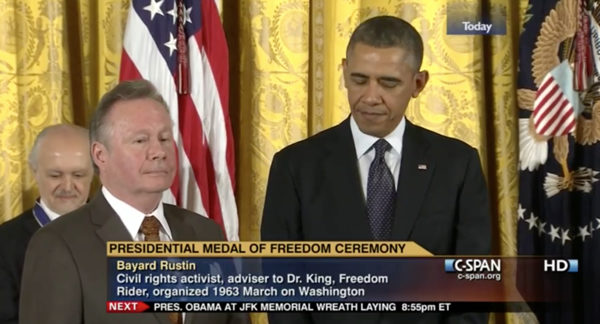
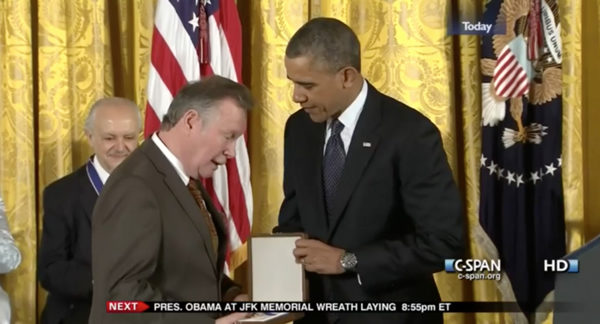
Born in 1912, Rustin learned about racism early on learned from his a Quaker grandmother in his West Chester, Pennsylvania hometown. She was also a member of the NAACP and intellectual civil rights leaders such as W.E.B. Du Bois and James Weldon Johnson were house guests.
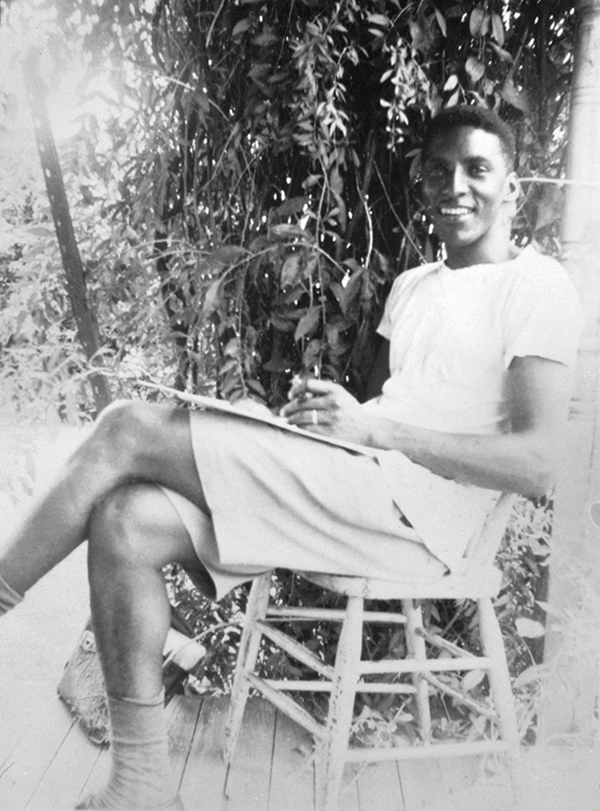
In high school, Rustin challenged the racially discriminatory Jim Crow laws by defying the rules to sit in the segregated balcony of a movie theater — for which he was arrested, as he recalled in the documentary Brother Outsider: The Life of Bayard Rustin.
“I once went into the little restaurant next to the Warner Theatre, and—can you believe it?—there was absolute consternation. That was the first occasion in which I knew West Chester had three police cars. They surrounded the place as if we were going to destroy motherhood. I purposely got arrested, and then I made an appeal that all the black people and white people who were decent-minded should give 10 cents to get me out of jail. And I got out, because they took up a collection.”
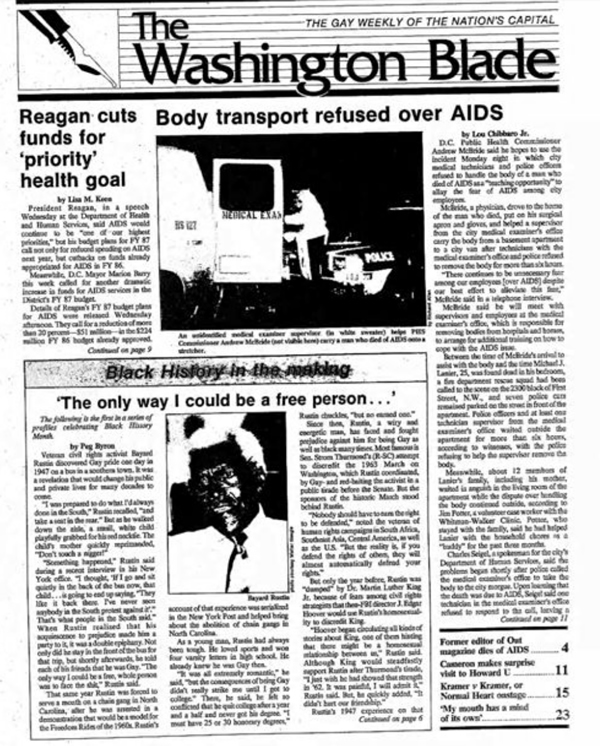
Rustin knew he was gay in high school, he told Washington Blade reporter Peg Byron on Feb. 5, 1986. But he remained closeted until 1947 after an encounter with a child on a bus trip in the South:
“One of the reasons that I decided that I should no longer remain in the closet came from an experience I had as a black. One day, in 19…, way back as far as 1947, I walked into a bus in the South, all prepared to do what I had always done in the South. Take a seat in the rear.
As I was going by the second seat to go to the rear, a white child reached out for the red necktie I was wearing and pulled it. Whereupon its mother said, “Don’t touch a nigger.”
Something happened, and I said to myself, If I go and sit quietly in the back of that bus now, that child who was so innocent of race relations that it was going to play with me, will have seen so many blacks go in the back and sit down quietly that it’s going to end up saying, “They like it back there, I’ve never seen anybody protest against it.” That’s what people in the South would say.
So I said, I owe it to that child, not only to my own dignity, but I owe it to that child that it should be educated to know that blacks do not want to sit in the back, and therefore I should get arrested letting all these white people in the bus know that I do not accept that.
Now, it occurred to me shortly after that that it was an absolute necessity for me to declare homosexuality, because if I didn’t I was a part of the prejudice. I was aiding and abetting…
Peggy Byron: Sitting in the back, yeah…
BR: … the prejudice that was a part of the effort to destroy me. And that in the long run the only way I could be a free whole person was to face the shit.
But from my own experience I know how long it can take till you free yourself. Thirty-four years is a long time to free yourself.”
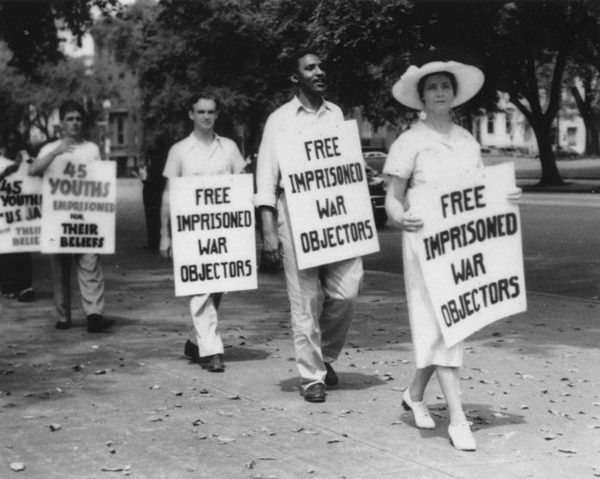
During those closeted years, he organized strikes in college, advocated to free the Scottsboro Boys, in 1936 joined the Young Communist League which fought segregation but left disillusioned when they dropped fighting Jim Crow to fight to get the US into World War II. Rustin then found two other pacifists – A. Philip Randolph, the head of the Brotherhood of Sleeping Car Porters and A. J. Muste, leader of the Fellowship of Reconciliation (FOR), who both became mentors.
By now Rustin was on FBI Director J. Edgar Hoover’s radar. Muste hired him to handle race relations. In 1941, the three pacifist socialists proposed a march on Washinton to protest segregation in the military and employment. After a meeting with President Roosevelt in the White House, FDR issued Executive Order 8802 (the Fair Employment Act) banning discrimination in defense industries and federal agencies. As an act of good faith in response, Randolph cancelled the march over Rustin’s objections. The military was finally desegregated in 1948 by President Truman, meaning black Americans fought racism and the Nazis and fascism, only to come home to Jim Crow.
Meanwhile, Rustin came to California to try to help Japanese Americans who were losing their property and their rights as the federal government imprisoned them in internment camps. He also foreshadowed the Freedom Rides by trying to desegregate interstate bus travel in 1942, for which he was arrested outside Nashville, beaten but never charged.
By 1948, the year after he came out, Rustin was well-known enough to be invited to India for an international pacifist conference.
“Mahatma Gandhi had been assassinated earlier that year, but his teachings touched Rustin in profound ways. ‘We need in every community a group of angelic troublemakers,’ he wrote after returning to the States. ‘The only weapon we have is our bodies, and we need to tuck them in places so wheels don’t turn,’” Prof. Gates writes.
The incident for which Rustin was pardoned happened in 1953. By now a respected organizer, Rustin traveled around the country giving speeches. After a speech one January night in Pasadena, police officers found him having sex with two white men in a parked car. Rustin was arrested, sentenced to jail for 60 days and was forced to register as a sex offender for the “morals charge.”
The arrest severely damaged his career in a country terrified by McCarthyism. He was forced to cancel speaking engagements and resigned from his leadership position with Muste’s Fellowship for Reconciliation.
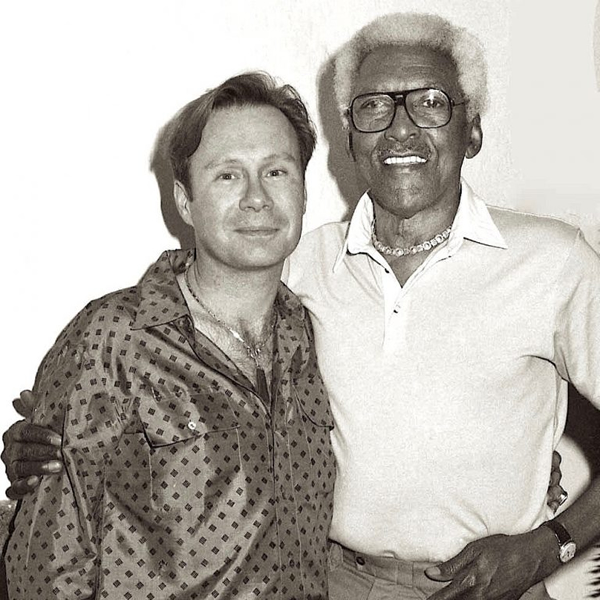
He struggled to find work, resorting to manual labor as a furniture mover, Naegle said later.
“I know now that for me sex must be sublimated if I am to live with myself and in this world longer,” he wrote in a March 1953 letter.
In 1955, Rustin secretly wrote “Speak Truth to Power: A Quaker Search for an Alternative to Violence.“In 1956, he found his way back into the civil rights movement, traveling to Alabama to advise Rev. Martin Luther King Jr. on how to organize his Montgomery Bus Boycott using Gandhi’s principles of non-violence. The two were introduced by Rustin’s friend Coretta Scott.
“King really had a very, very limited idea about nonviolence,” Julian Bond, who helped found the Student Nonviolent Coordinating Committee, told Democracy Now’s Amy Goodman. “It is Bayard Rustin who really tutored him, who said, ‘This is what you have to do.’ Rustin was horrified to see these pistols in King’s home, you know, and these armed guards around King’s home, because it just went against everything he believed in about nonviolence. If it hadn’t been for Bayard Rustin, Dr. King wouldn’t have had any understanding, I don’t think, of nonviolence. And Rustin tutored him and made him into the person we know he became.”
But that arrest record and the “open secret” of his homosexuality haunted him. Rustin was forced to resign from the Southern Christian Leadership Conference he co-founded after the powerful New York Rep. Adam Clayton Powell Jr. threatened to tell the press that he and King were lovers.
Gay historian, John D’Emilio author of “Lost Prophet: The Life and Times of Bayard Rustin,” told Amy Goodman:
“Bayard himself was very aware that given social attitudes towards homosexuality and gay men and lesbians, he couldn’t wear it on his sleeve. He couldn’t, you know, be out there with the rainbow flag. This was before gay liberation. So Bayard himself was perfectly happy to keep this in the background and to move out of the way, if that was going to be good for the movement.
What made him unhappy and what made him feel like he had been done wrong was when people disavowed him. And there was a point, in 1960, when Rustin and Mr. Randolph and Dr. King were part of organizing major demonstrations at the presidential conventions, Republicans and Democrats, and at that point Representative Adam Clayton Powell from Harlem didn’t like the fact that these radicals, someone like Bayard Rustin, was getting so much attention and moving into his sphere in the Democratic Party.
And he put out the word to Dr. King that if you don’t distance yourself from Bayard Rustin, I am going to claim that there is something going on between the two of you. And that scared Dr. King, and Bayard made the decision to resign from his position. But he also expected at that point that he would be defended. And when he wasn’t defended, it was—it was painful. It was very painful. And he spent a couple of years, mostly—in the early ’60s, mostly involved in the peace movement rather than in the civil rights movement because of that rupture. And it’s the March on Washington that brought him back into the center of things.”
“That was around 1962,” Rustin told the Washington Blade via the special Making Gay History podcast. “And, naturally, I took the position that if people feel that I am a danger to some important movement, I would leave. But the thing which distressed me was that if… if Martin had taken the strong stand then that he took a year later, in ’63, vis-à-vis Strom Thurmond, he could have overcome it and kept me. But I understand his doing it, and I hold no grief with him about having done it. I just wish that he had shown the strength in ’62 that he showed when he backed me completely in ’63. But he was a year older and had another year’s experience.”
A. Philip Randolph brought Rustin back into the fold to organize the 1963 March on Washington for Jobs and Freedom but NAACP’s Roy Wilkins saw Rustin as a liability and forced him to take a deputy position.
But then FBI Director J. Edger Hoover slipped Rustin’s arrest record to rabidly anti-gay South Carolina Sen. Strom Thurmond – who had secretly fathered a child with his African-America maid. Three weeks before the march, Thurmond went public, trying to destroy the unprecedented event by denouncing Rustin as a gay communist and placing his arrest record in the congressional record.
Rustin told the Washington Blade:
“Now this became very clear to me in 1963, when I was organizing the March on Washington. And Strom Thurmond stood up in the Senate of the United States and for three-quarters of an hour, attacked me as a draft dodger, which was untrue, because I was a conscientious objector and well known as being a Quaker opposed to all violence. He attacked me as a former member of the Young Communist League, which was true. I had been. He attacked me as a homosexual. Which of course I was.
PB: You were the original commie-pinko-fag of the day, I suppose.”
BR: Yeah, exactly. Now, there were 10 leaders of that march. One of the most important Jews, the most important Catholic, the most important Protestant, Walter Reuther representing the trade union movement, and six black civil rights leaders.
When he attacked me, I had absolutely no basic apprehension and for a very good reason, because I had spent a great deal of my life defending prejudice against Catholics, against trade unions, against Jews, against blacks, against Protestants, and therefore I inwardly knew that those leaders, knowing of my history, had to come to my defense. And they did. And the important thing was that they voted that only one person should speak, and that was the founder of the march, Mr. A. Philip Randolph.”
For what spans five pages in the Congressional Record, Thurmond not only submitted the arrest record but the news articles about the arrest and conviction.
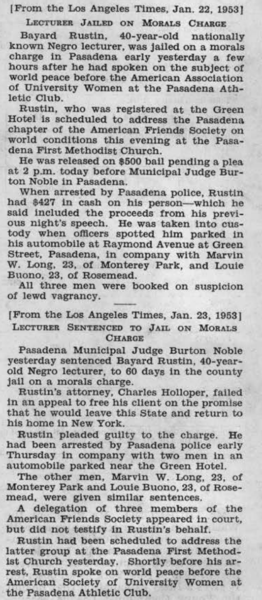
“The article states that he was convicted in 1953 in Pasadena, California, of a morals charge. The words ‘morals charge’ are true. But this is a clear-cut case of toning down the charge. The conviction was sex perversion,” says Thurmond.
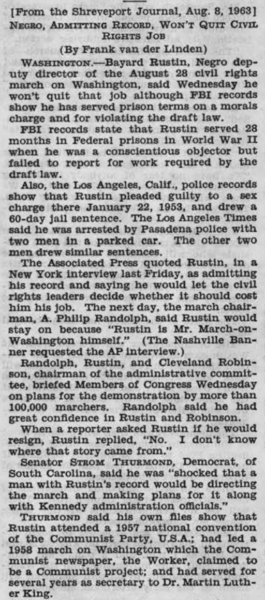
“The senator is not interested in me if I were a murderer, a thief, a liar or a pervert. The senator is interested in attacking me because he is interested in destroying the movement. He will not get away with this,” Rustin said.
King and the other Big Six backed Rustin up this time because the attacks came from one of the worst Southern white supremacists. But after the march, Rustin was quietly denied his role as the seventh in the Bix Six group of civil rights leaders who called for the march: A. Philip Randolph, Roy Wilkins, Rev. Dr. Martin Luther King Jr., John Lewis, Jim Farmer, Whitney Young when the chief organizer of the march was disinvited to the White House to celebrate with President John F. Kennedy.
And yet, according to an extensive CNN report commemorating the 50th anniversary of the march, it was Rustin who saved the march for the organizers – from a Kennedy take over.
“The Kennedys were almost morbidly afraid of this march. They understood there’d been nothing like it,” Rep. Eleanor Holmes Norton, D-District of Columbia, who helped plan the march, told CNN.
“The Kennedy administration was afraid that if there was violence on the march, it would mean that the Civil Rights Act, which John F. Kennedy had just introduced, would never get passed,” said march planner Rachelle Horowitz. “When we first began planning the march, there was a concerted effort by the Kennedy administration to get it called off and to not let it take place.”
“They kept a watchful eye on the planning of the march,” said John Lewis, the 23-year-old elected to lead the Student Nonviolent Coordinating Committee. “They stayed in touch with the (march) leadership,” which had been broadened to include four white leaders, representatives of the Protestant, Jewish and Catholic faiths, and civil rights advocate and United Auto Workers president Walter Reuther.
Reuther was recruited by the White House “to infiltrate the march and steer it away from radical rhetoric and direct action,” wrote Charles Euchner in his book “Nobody Turn Me Around,” about the historic march. “And so he did.”
Though JFK had come around to the idea of the march, Attorney General Robert F. Kennedy’s office inside the Justice Department’s room 5110 “was the command center,” Jack Rosenthal, who was the department’s assistant press officer at the time, told CNN.
“There was a proposal on the table that Kennedy speak to the March on Washington,” march planner Courtland Cox told CNN. “And Bayard knew this would have been a disaster because it would’ve been taken over by (Kennedy) just because he’s president. It would’ve been Kennedy’s march.”
From CNN:
“So, Cox said Rustin and he excused themselves from that particular meeting and took a walk to the bathroom. Clearly flummoxed about the problem, Rustin took a sip from his back-pocket flask and came up with an idea on the fly.
“And Bayard got back into the meeting and he literally made this up,” Cox recalled. “He said that he heard … if the president spoke the Negroes were going to stone him.”
After that, the idea of Kennedy speaking at the march was never considered.”
None of the feared outbreaks of violence occurred.
“After the March on Washington was over, President Kennedy had invited us back down to the White House,” Lewis said. “He stood in the door of the Oval Office and he greeted each one of us. He was like a beaming, proud father. He was so pleased. So happy that everything had gone so well.”
Kennedy told King: “And you had a dream,” added Lewis.
Rustin’s role was overshadowed – as were his remarks at the march that August 28, 1963:
“We demand that segregation be ended in every school district in the year 1963! We demand that we have effective civil rights legislation—no compromise, no filibuster—and that include public accommodations, decent housing, integrated education, FEPC and the right to vote. What do you say? We demand the withholding of federal funds from all programs in which discrimination exists. What do you say?”
Rustin died of a perforated appendix on August 24, 1987, survived by Walter Naegle, his partner of 10 years.
One last thing, Julian Bond told Amy Goodman:
“I could not think of anybody else who at the time would have stepped forward, taken hold of this March on Washington, pull together all these hundreds of thousands of peoples, the buses, the trains. You know, I saw something just recently: They made 800,000 sandwiches. Imagine that. And it was all done at Bayard Rustin’s desire.
One thing I think we’re not hearing about Bayard Rustin is his sense of humor. He once said that Dr. King couldn’t bring vampires to a bloodbath. That was the kind of organizer Dr. King was not. But Bayard Rustin knew he was an organizer and was just wonderful at getting people to do things that they didn’t think they could do or didn’t know they wanted to do. He was just a great, great person….
I think those of us who were there in 1963 didn’t immediately realize how significant this was. As you said during the program, we didn’t see many people there early in the morning. The crowd grew and grew and grew. But even when they were all there, you had no idea how many there were. You know, you can’t look out at this mass of people and say, “This is 250,000 people.” You just have no idea who they are. And I think, for me, driving back to Atlanta later that day and then reading newspapers the next day in Atlanta and hearing what other people had to say about it, only then would we began to understand the significance of this thing—the largest gathering ever at a civil rights protest.
People came together to demand civil rights in America, and that was tremendously significant. But, as you say, if you compare these demands that Bayard read at the march with where we are today, you can see that clearly most of these things have not been achieved, and we still have a long, long way to go.”
While Rustin didn’t attend the White House meeting, he and A. Philip Randolph did make the cover of LIFE magazine.
“Rustin was one of the most important social justice activists in the U.S. in the 20th century,” says historian John D’Emilio.
That 1953 arrest record hung like an invisible chain around Rustin’s neck. Now he is really, finally free.
If you think you are eligible and would like to seek clemency, you can apply for a pardon and receive updates and information on the clemency initiative at www.gov.ca.gov/clemency
a&e features
Transmission DC breathes new life into a storied sound space
A fresh home for boundary-pushing culture on H Street

Late last year, phoenix-style, a fresh home for boundary-pushing culture arose on the H Street corridor. Transmission DC – a queer, trans, and POC-owned, operated, and centered community-focused venue – powered on in the former home to the Rock & Roll Hotel (famously, not a hotel, but very much rock & roll). Transmission (1353 H St., N.E.) arrives secure in its mandate – or even birthright – to provide a place to celebrate creativity and music through a lens of inclusivity and respect.
Transmission’s team brings experience, but also representation. Owners/partners Kabir Khanna (who is also programming director), Katii B, Ellie McDyre, and Kelli Kerrigan together previously managed 618 productions, a venue in Chinatown, crafting “some of D.C.’s freakiest parties, raves, and mosh pits” they note.
They packed up operations last fall to a space curated specifically for D.C.’s underground music and culture scene, building their efforts in Chinatown to bring in more fans in queer and POC circles.
Transmission, Khanna points out, is built on DIY values. In the music scene, DIY means that promoters and organizers – often disconnected from the mainstream and part of marginalized communities – build shows and programs collaboratively, but independently from institutions, supporting each other as smaller, independent venues close. Here, Transmission aims to ensure that those putting together these underground inclusive shows have a more permanent and stable home, can have access to resources, and can provide more sustainable income to artists. “We’re trying to get more people to support and enjoy the music, and also give artists and organizers within the DIY community more structure and a larger cut,” says Khanna.
Khanna also notes that Transmission operates “under the principles of safety, inclusivity, and respect.” McDyre added that even at venues that claim inclusivity, that statement might not take place in practice. We’re “not just pitting up a rainbow flag,” says McDyre, but as some of the owners are trans and POC, audiences can see themselves reflected at the top.
Much like the DIY nature of the music community, the Transmission owners brought a DIY ethos to turning around their space.
In March 2020 – the height of COVID lockdowns – Rock & Roll Hotel suddenly shuttered, though not due to the pandemic; instead, the venue claimed that decreasing sales and increasing competition led to the closure. For 14 years, it was the central spot for cheap beer and lesser-known and celebrated acts. The space stood vacant for more than five years, until Transmission turned the power back on.
“When we got into the space, it was effectively abandoned for years,” says Khanna. “There was a ton of mold, and paint primer covering all surfaces. It was nearly falling apart.” Khanna noted that many music venues like this one, regardless of how well it was maintained, “get the shit kicked out of it,” given the nature of shows. The team called in mold removal contractors, ripped up most of the floorboards, and started fresh.
Transmission’s first floor is styled as a stripped-down black box: the better to take in the music. “It’s minimal on purpose to act as a canvas for set design and music,” without a specific aesthetic, says Khanna. Moving upstairs, the second floor has been opened up, removing some walls, and now has a larger dance area than the first floor. Beyond the first two performance levels, and a holdover from Rock & Roll Hotel, is the rooftop. Though without a stage, the rooftop space is filled with murals splashed across the walls, with a full bar. Transmission’s current capacity is 496, but the team is looking to grow that number. Transmission will also leverage the full kitchen that Rock & Roll Hotel operated, bringing in Third Hand Kitchen to offer a variety of food, including vegan and vegetarian options.
Khanna pointed out an upcoming show reflective of Transmission’s inclusive ethos: Black Techo Matters on Feb. 27. The event is set to be “a dynamic, collaborative night of underground electronic music celebrating Black History Month.” Khanna says that techno came from Black music origins, and this event will celebrate this genesis with a host of artists, including DJ Stingray 313, Carlos Souffront, and Femanyst.
a&e features
Meet D.C.’s Most Eligible Queer Singles
Our annual report, just in time for Valentine’s Day

Just in time for Valentine’s Day, the Blade is happy to present our annual Most Eligible Singles issue. The Singles were chosen by you, our readers, in an online nominations process.
John Marsh

Age: 35
Occupation: DJ and Drag Entertainer
How do you identify? Male
What are you looking for in a mate? I’m looking for someone who’s ready to dive into life’s adventures with me. someone independent and building their own successes, but equally open to supporting each other’s dreams along the way. I know that probably sounds simple because, honestly, who isn’t looking for that? But my life and career keep me very social and busy, so it’s important to me to build trust with someone who understands that. I want a partner who knows that even when life gets hectic or I’m getting a lot of attention through my work in the community, it doesn’t take away from my desire to build something real, intentional, and meaningful with the right person.
Biggest turn off: My biggest turnoff is arrogance or judgment toward others. I’m most drawn to people who are comfortable being themselves and who treat everyone with the same level of respect and care. I’ve worked hard for the success I’ve found, but I believe in staying humble and leading with kindness, and I’m attracted to people who live the same way. I’m also turned off by exclusionary mindsets, especially the idea that sapphic folks don’t belong in gay spaces. Our community is vibrant, diverse, and strongest when it’s shared with everyone who shows up with respect and love
Biggest turn on: I’m drawn to people who can confidently walk into new spaces and create connection. Being able to read a room and make others feel comfortable shows emotional intelligence and empathy, which I find incredibly attractive. I also come from a very social, open, and welcoming family environment, so being with someone who embraces community and enjoys bringing people together is really important to me.
Hobbies: I have a lot of hobbies and love staying creative and curious. I’m a great cook, so you’ll never have to worry about going hungry around me. In my downtime, I watch a lot of anime and I will absolutely talk your ear off about my favorites if you let me. I’m also a huge music fan and K-pop lover (listen to XG!), and I’m a musician who plays the cello. I spend a lot of time sewing as well, which is a big part of my creative expression. My hobbies can be a little all over the place, but I just genuinely love learning new skills and trying new things whenever I can.
What is your biggest goal for 2026? This year feels like a huge milestone for me. I’m getting ready to join a tour this summer and want to represent myself well while building meaningful connections in every city I perform in. I’m also focused on growing as a DJ, sharing more mixes and content online, and reaching a big creative goal of releasing original music that I’m producing.
Pets, Kids or Neither? I have a lovely Akita named Grady that I’ve had for 10 years and always want pets in my life. I’m open to kids when/if the time is right with the right person.
Would you date someone whose political views differ from yours? Hell no. I don’t see political differences as just policy disagreements anymore – they often reflect deeper values about how we treat people and support our communities. I’m very progressive in my beliefs, and I’m looking for a partner who shares that mindset. For me, alignment in values like equity, compassion, and social responsibility is non-negotiable in a relationship. To be very clear about my beliefs, I’m outspoken about my opposition to immigration enforcement systems like ICE and believe both political parties have contributed to policies that have caused real harm to vulnerable communities. I’m also deeply disturbed by the ongoing violence in Palestine and believe we need to seriously examine our support of military actions that have resulted in the loss of countless innocent lives. These aren’t abstract political opinions for me, they are moral issues that directly inform who I am and what I stand for.
Celebrity crush: Cocona
Name one obscure fact about yourself: I used to own a catering business in college that paid for my school — I also went to a Christian college, lol.
Jackie Zais

Age: 35
Occupation: Senior director at nonprofit
How do you identify? Lesbian woman
What are you looking for in a mate? Looking for someone who’s curious about the world and the people in it — the kind of person who’s down to explore a new spot one night and stay in with takeout the next. Confident in who they are, social without being exhausting, adventurous but grounded, thoughtful but not pretentious. Someone who can be funny while still taking life (and relationships) seriously.
Biggest turn off: Doesn’t have strong opinions. I love hearing a wild hot take.
Biggest turn on: When someone can make me belly laugh.
Hobbies: Number one will always be yapping with friends over food, but I also love collecting new hobbies. Currently, I crochet (and have some dapper sweater vests as a result), listen to audiobooks on what I personally think is a normal speed (2x) and play soccer and pickleball. But I’ve tried embroidery, papier-mâché, collaging, collecting plants, scrap booking, and mosaic.
What is your biggest goal for 2026? I’ve recently started swimming and I want to look less like a flailing fish and more like someone who knows what they’re doing.
Pets, Kids or Neither? I have neither but open to kids
Would you date someone whose political views differ from yours? My best friend is a moderate Democrat and that’s as far right as I’m willing to go.
Celebrity crush: Tobin Heath
Name one obscure fact about yourself: I’m the daughter of Little Miss North Quincy 1967.
Kevin Schultz

Age: 39
Occupation: Product manager
How do you identify? Gay
What are you looking for in a mate? You know 2001’s hottest Janet Jackson single, “Someone to Call My Lover?” To quote Janet, “Maybe, we’ll meet at a bar, He’ll drive a funky car; Maybe, we’ll meet at a club, And fall so deeply in love.”
Realistically though, I’d love to find someone who loves to walk everywhere and who avoids the club because it’s too loud and crowded. Later in the song, our songstress opines “My, my, looking for a guy, guy, I don’t want him too shy; But he’s gotta have the qualities, That I like in a man: Strong, smart, affectionate” and I’m quite aligned there – I’m an introvert looking for someone more extroverted.
I’m looking for someone who is different from me. When the math works, one plus one should equal two. Two becoming one is more art, and my relational approach is more science, or, I guess, math.
Biggest turn off: I’m turned off by a lot of superficially small things — chewing with one’s mouth open, dirty or untrimmed fingernails, oh, and also, lack of self awareness. My personal brand of anxiety is hyper self-aware, so I’m very turned off by someone who doesn’t realize that they exist in the world with others.
Biggest turn on: Competency. Or maybe…eyes? So perhaps, you see my conundrum — I’m very engaged by people who are deeply engaged by something, but I’d be lying if I said a sharp gaze and a wink didn’t get me. And, you know, some stamina in all avenues, mental and physical doesn’t hurt either.
Hobbies: Fixing everyone’s WiFi (this did actually get me a date once), and just generally fixing everyone’s everything. If it’s got a plug, screen, or buttons I can probably help you with it. On my own, I’m really into smart home devices and automation, and just to be timely, my latest thing is setting up and tuning my own instance of OpenClaw. (No one should actually do this, which is why I’m trying.) Together, we could also explore such hobbies as visiting every Metro station, visiting and exploring a new airport, and exploring why there are so many gay transit nerds. There’s no non-fake sounding way to say this but I also just love knowledge seeking, so I’d also love to go on an adventure with you where we learn something brand new.
What is your biggest goal for 2026? My biggest goal is to arrive to 2027 just a little better than I arrived to 2026. A few gym goals, a few personal goals, a few work goals; I hope to get a few of them across the finish line. At the risk of holding myself accountable, one of those goals is to be able to flawlessly side plank for over a minute. Please don’t mistake me for a huge gym rat; I just have a questionable relationship with balance and I’m really working on it.
Pets, Kids or Neither? I’ll just be blunt: no pets. Stating this on my Hinge profile resulted in an exponential loss of matches, so it’s very fun to trot out the idea. Primarily, I’m allergic to cats and dogs so my aversion is mostly biological. I’m not, however, allergic to kids — big fan of my various nieces and nephews — but I’d really only consider kids of my own if my chosen companion and I could financially afford them without compromise, and at this age I’ve become opinionated about the life I want to live.
Would you date someone whose political views differ from yours? No. This becomes a simpler answer with each passing day, unfortunately.
Celebrity crush: If I’m being of the moment, of course, it’s going to be one of the gentlemen on “Heated Rivalry,” but if I were to really dig into the archives it would be pre-Star Trek Chris Pine. I first saw him in an absolute train wreck of a movie called “Blind Dating” where he plays a blind guy who tries to pretend to be sighted in order to date. The movie was terrible, but I found him irresistible.
Name one obscure fact about yourself: I went suddenly deaf on one side only (my left) just before my 33rd birthday. After a bit of time in the wilderness (metaphorically) I got a cochlear implant a few years later, and it really changed my life. I will talk until someone stops me about hearing, sound, and the amazing arena of hearing loss technology. A lot of people, when they see my implant, assume I was born with hearing loss, so it’s always a bit odd (obscure even!) when I tell people I lost it as an adult. But, I also got my hearing back as an adult and am an eager advocate for assistive technology and visibility for people with disabilities that are not always immediately visible. I also work with prospective adult implant candidates to determine if an implant is right for them, because losing hearing suddenly as an adult is isolating and it’s helpful to talk to someone who’s been there.
Gabriel Acevero

Age: 35
Occupation: Maryland State Delegate
How do you identify? Gay
What are you looking for in a mate? Emotional intelligence and a sense of humor.
Biggest turn off: Fetishization.
Biggest turn on: Kindness and emotional intelligence.
Hobbies: Traveling and reading (I love books).
What is your biggest goal for 2026? More self care. I love what I do but it can also be physically taxing. In 2026, I’m prioritizing more self care.
Pets, Kids or Neither? I have neither but I’m open to both.
Would you date someone whose political views differ from yours? No.
Celebrity crush: Kofi Siriboe
Name one obscure fact about yourself: I’m a Scorpio who was raised by a Scorpio and I have many Scorpios in my life.
Vida Rangel

Age: 36
Occupation: Public Servant, Community Organizer
How do you identify? I am a queer transLatina
What are you looking for in a mate? I’m looking for a partner who is caring, socially aware, and passionate about meaningfully improving some part of this world we all live in. Ideally someone playful who can match my mischievous energy, will sing and dance with me whenever joy finds us, and will meet me at protests and community meetings when the moment calls for bold collective action.
Biggest turn off: Ego. Confidence can be cute, but humility is sexy.
Biggest turn on: Drive. Seeing someone put their heart into pursuing their goals is captivating. Let’s chase our dreams together!
Hobbies: Music in all its forms (karaoke, playing guitar, concerts, musicals…), finding reasons to travel to new places, and making (Mexican) tamales for friends and coworkers.
What is your biggest goal for 2026? My biggest goal for 2026 is to organize and a celebratory kiss on election night wouldn’t hurt.
Pets, Kids or Neither? An adorable black cat named Rio (short for Misterio)
Would you date someone whose political views differ from yours? Ma’am? If you feel the need to ask…
Celebrity crush: Mi amor, Benito Bad Bunny. Zohran Mamdani, too. I have lots of love to give.
Name one obscure fact about yourself: I worked at Chick-fil-A when I was in high school and was fired after just three months. At the time it was still legal to fire someone for being trans, but I’m pretty sure it was because I called out to go to a Halloween party.
Em Moses

Age: 34
Occupation: Publishing
How do you identify? Queer
What are you looking for in a mate? Companionship, passion, fun. I seek a confident partner who inspires me, someone to laugh and dance with, someone with a rich internal universe of interests and experiences to build upon. A lifelong friend.
Biggest turn off: Dishonesty.
Biggest turn on: I love when someone is exactly themselves, nurturing their passions and skills and showing up uniquely in this world as only they can.
Hobbies: I love to read. I create art with my hands. When the weather is nice I’m outside, walking around the District looking at flowers and trees.
What is your biggest goal for 2026? My main goal this year is to spend more time with my nieces and nephews.
Pets, Kids or Neither? No pets or children in my life currently.
Would you date someone whose political views differ from yours? While I consider myself quite openminded and genuinely enjoy learning from perspectives different from my own, I have clear boundaries around my morals and those pillars do not fall.
Celebrity crush: Luigi Mangione
Name one obscure fact about yourself: My first job was at a donut shop.
Nate Wong

Age: 41
Occupation: Strategy adviser to nonprofits and philanthropists to help ambitious ideas turn into meaningful, positive societal impact.
How do you identify? Gay (he/him)
What are you looking for in a mate? An additive partner: sociable, adventurous, and curious about the world. I’m drawn to warmth, openness, and people who show up fully — one-on-one and in community. If you enjoy a good dinner party, make eye contact, and actually talk to strangers (I know a D.C. no-no), we’ll get along just fine.
Biggest turn off: Not being present. Active listening matters to me; attention is a form of respect (and honestly, very attractive). And a picky food eater (how will we some day be joint food-critics?).
Biggest turn on: Curiosity, adventuresome spirit, and someone who can hold their own in a room — and still make others feel at ease. Confidence is best when it’s generous.
Hobbies: Splitting my time between the ceramics studio (District Clay), planning the next trip, and finding great food spots. I box to balance it all out, and I love curating small, adventurous gatherings that bring interesting people together — the kind where you stay later than planned.
What is your biggest goal for 2026? The last few years threw some curve balls. So 2026 is all about moving forward more freely and passionately, trusting what feels right and following it with intention (and joy).
Pets, Kids or Neither? Open to kids (in a variety of forms — already have some adorable god kids). A hypoallergenic dog would absolutely raise the cuddle quotient; cats are best admired from a respectful, allergy-safe distance.
Would you date someone whose political views differ from yours? I value thoughtful listening and sincere debate; shared values around the honoring of everyone’s humanity, equity, and justice matter to me and aren’t up for debate.
Celebrity crush: Bad Bunny style with Jason Momoa humble confidence (harking to my Hawaiian roots) and Idris Elba charm — range matters.
Name one obscure fact about yourself: I celebrated medical clearance by going surfing in El Salvador. I’ve also nearly been arrested in Mozambique and somehow walked away unscathed (and without complying with a bribe) — happy to explain over an excursion.
Diane D’Costa

Age: 29
Occupation: Artist + Designer
How do you identify? Queer/lesbian
What are you looking for in a mate? A cuddle buddy, a fellow jet setter, a muse! Someone to light my soul on fire (in a good way).
Biggest turn off: Apathy. I care deeply about a lot of things and need someone with a similar curiosity and zest for life.
Biggest turn on: Mutuality really does it for me — a push and pull, someone who will throw it back and also catch it. I love someone who takes initiative, shows care and compassion, and expresses fluidity and confidence.
Hobbies: You can find me throwing pottery, painting, sipping natural wine, supporting local coffee shops, and most definitely tearing up a QTBIPOC dance floor.
What is your biggest goal for 2026? Producing my first solo art show. This year I’m really leaning into actualizing all my visions and dreams and putting them out into the world.
Pets, Kids or Neither? I’ve got a Black Lab named Lennox after the one and only D.C. icon, Ari Lennox. I love supporting the youth and (made a career out of it), but don’t necessarily need to have little ones of my own.
Would you date someone whose political views differ from yours? No. Values alignment is key, but if you wanna get into the nuances of how we actualize collective liberation let’s get into it.
Celebrity crush: Queen Latifah
Name one obscure fact about yourself: I’m in the “Renaissance” movie. I know, I know slight flex… but “Crazy In Love” bottom left corner for a split second and a harsh crop, but I’m in there. “You are the visuals, baby” really hit home for me.
Donna Marie Alexander

Age: 67
Occupation: Social Worker
How do you identify? Lesbian
What are you looking for in a mate? Looking for a smart, kind, emotionally grown woman who knows who she is and is ready for real companionship. Also, great discernment and a good lesbian processor. Bonus points if you’ll watch a game with me— or at least cheer when I do. Extra bonus if you already know that women’s sports matter.
Ideal first date: Out for tea or a Lemon Drop that turns into dinner, great conversation, and a few laughs. Low drama, high warmth.
Must haves: A sense of humor, curiosity about the self, curiosity about me, and curiosity about the world. An independence, and an appreciation for loyalty—on and off the field. Dealbreaker: Anyone who thinks “it’s just a game.”
Biggest turn off: Self-centered and a lack of discernment.
Biggest turn on: Great conversation and a sense of humor.
Hobbies: Watching the Commanders game
What is your biggest goal for 2026? Self-growth and meeting an amazing friend.
Pets, Kids or Neither? I have two kids and grandkids.
Would you date someone whose political views differ from yours? No
Celebrity crush: Pam Grier
Name one obscure fact about yourself: She’s way more superstitious about game-day routines than she lets on
Joe Reberkenny

Age: 24
Occupation: Journalist
How do you identify? Gay
What are you looking for in a mate? Someone who’s driven, flexible, and independent. I’m a full-time journalist so if there’s news happening, I’ve gotta be ready to cover breaking stories. I’m looking for someone who also has drive in their respective career and is always looking to the future. I need someone who gets along with my friends. My friends and community here are so important to me and I’m looking for someone who can join me in my adventures and enjoys social situations.
Biggest turn off: Insecurity and cocky men. Guys who can’t kiki with the girls. Early bedtimes.
Biggest turn on: Traits: Emotional stability and reliability. A certain sense of safety and trust. Someone organized and open to trying new things. Physical: Taller than I am (not hard to do at 5’7″) but also a preference for hairy men (lol). Someone who can cook (I am a vegetarian/occasional pescatarian and while it’s not a requirement for me in a partner it would need to be something they can accommodate).
Hobbies: Exploring D.C. — from museums to nightlife, reading (particularly interested in queer history), dancing, frolicking, playing bartender, listening to music (preferably pop), classic movie connoisseur (TCM all the way).
What is your biggest goal for 2026? Continue my work covering LGBTQ issues related to the federal government, uplift queer voices, see mother monster (Lady Gaga) in concert.
Pets, Kids or Neither? I’ve got neither but I love a pet.
Would you date someone whose political views differ from yours? No
Celebrity crush: Pedro Pascal
Name one obscure fact about yourself: I’ve been hit by multiple cars and I have a twin sister.
a&e features
Marc Shaiman reflects on musical success stories
In new memoir, Broadway composer talks ‘Fidler,’ ‘Wiz,’ and stalking Bette Midler

If you haven’t heard the name Marc Shaiman, you’ve most likely heard his music or lyrics in one of your favorite Broadway shows or movies released in the past 50 years. From composing the Broadway scores for Hairspray and Catch Me if You Can to most recently working on Only Murders in the Building, Hocus Pocus 2, and Mary Poppins Returns, the openly queer artist has had a versatile career — one that keeps him just an Oscar away from EGOT status.
The one thing the award-winning composer, lyricist, and writer credits with launching his successful career? Showing up, time and time again. Eventually, he lucked out in finding himself at the right place at the right time, meeting industry figures like Rob Reiner, Billy Crystal, and Bette Midler, who were immediately impressed with his musical instincts on the piano.
“Put my picture under the dictionary definition for being in the right place at the right time,” Shaiman says. “What I often try to say to students is, ‘Show up. Say yes to everything.’ Because you never know who is in the back of the theater that you had no idea was going to be there. Or even when you audition and don’t get the part. My book is an endless example of dreams coming true, and a lot of these came true just because I showed up. I raised my hand. I had the chutzpah!”
Recalling one example from his memoir, titled Never Mind the Happy: Showbiz Stories from a Sore Winner ( just hit bookshelves on Jan. 27), Shaiman says he heard Midler was only hiring Los Angeles-based artists for her world tour. At the young age of 20, the New York-based Shaiman took a chance and bought the cheapest flight he could find from JFK. Once landing in L.A., he called up Midler and simply asked: “Where’s rehearsal?”
“Would I do that nowadays? I don’t know,” Shaiman admits. “But when you’re young and you’re fearless … I was just obsessed, I guess you could say. Maybe I was a stalker! Luckily, I was a stalker who had the goods to be able to co-create with her and live up to my wanting to be around.”
On the occasion of Never Mind the Happy’s official release, the Bladehad the opportunity to chat with Shaiman about his decades-spanning career. He recalls the sexual freedom of his community theater days, the first time he heard someone gleefully yell profanities during a late screening of The Rocky Horror Picture Show, and why the late Rob Reiner was instrumental to both his career and his lasting marriage to Louis Mirabal. This interview has been edited and condensed.
BLADE: Naturally, a good place to start would be your book, “Never Mind the Happy.” What prompted you to want to tell the story of your life at this point in your career?
SHAIMAN: I had a couple of years where, if there was an anniversary of a movie or a Broadway show I co-created, I’d write about it online. People were always saying to me, “Oh my God, you should write a book!” But I see them say that to everybody. Someone says, “Oh, today my kitten knocked over the tea kettle.” “You should write a book with these hysterical stories.” So I just took it with a grain of salt when people would say that to me. But then I was listening to Julia Louis-Dreyfus’ podcast, and Jane Fonda was on talking about her memoir — not that I’m comparing myself to a career like Jane Fonda’s — but she felt it was time to take a life review. That really stuck in my head. At the time, I was sulking or moping about something that had not gone as well as I wished. And I guess I kind of thought, “Let me look back at all these things that I have done.” Because I have done a lot. I’m just weeks short of my 50th year in show business, despite how youthful I look! I just sat down and started writing before anyone asked, as far as an actual publisher.
I started writing as a way to try to remind myself of the joyous, wonderful things that have happened, and for me not to always be so caught up on what didn’t go right. I’ve been telling some of these stories over the years, and it was really fun to sit down and not just be at a dinner party telling a story. There’s something about the written word and really figuring out the best way to tell the story and how to get across a certain person’s voice. I really enjoyed the writing. It was the editing that was the hard part!
BLADE: You recall experiences that made you fall in love with the world of theater and music, from the days you would skip class to go see a show or work in regional productions. What was it like returning to those early memories?
SHAIMAN: Wonderful. My few years of doing community theater included productions that were all kids, and many productions with adults, where I was this freaky little 12-year-old who could play show business piano beyond my years. It was just bizarre! Every time a director would introduce me to another cast of adults, they’d be like, “Are you kidding?” I’d go to the piano, and I would sightread the overture to Funny Girl, and everybody said, “Oh, OK!” Those were just joyous, wonderful years, making the kind of friends that are literally still my friends. You’re discovering musical theatre, you’re discovering new friends who have the same likes and dreams, and discovering sex. Oh my god! I lost my virginity at the opening night of Jesus Christ Superstar, so I’m all for community theater!
BLADE: What do you recall from your early experiences watching Broadway shows? Did that open everything up for you?
SHAIMAN: I don’t remember seeing Fiddler on the Roof when I was a kid, but I remember being really enthralled with this one woman’s picture in the souvenir folio — the smile on her face as she’s looking up in the pictures or looking to her father for approval. I always remember zooming in on her and being fascinated by this woman’s face: turns out it was Bette Midler. So my love for Bette Midler began even before I heard her solo records.
Pippin and The Wiz were the first Broadway musicals I saw as a young teenager who had started working in community theater and really wanted to be a part of it. I still remember Pippin with Ben Vereen and all those hands. At the time, I thought getting a seat in the front row was really cool — I’ve learned since that it only hurts your neck, but I remember sitting in the front row at The Wiz as Stephanie Mills sang Home. Oh my god, I can still see it right now. And then I saw Bette Midler in concert, finally, after idolizing her and being a crazed fan who did nothing but listen to her records, dreaming that someday I’d get to play for her. And it all came true even before I turned 18 years old. I just happened to be in the right place at the right time, and met one of her backup singers and became their musical director. I was brought to a Bette Midler rehearsal. I still hadn’t even turned 18, she heard me play and said, “Stick around.” And I’ve stuck around close to 55 years! She’s going to interview me in L.A. at the Academy Museum. Would I have ever thought that Bette Midler would say yes to sitting with me, interviewing me about my life and career?
BLADE: That’s amazing. Has she had a chance to read the book yet?
SHAIMAN: She read it. We just talked yesterday, and she wants to ask the right questions at the event. And she even said to me, “Marc, I wasn’t even aware of all that you’ve done.” We’ve been great friends for all these years, but sometimes months or almost years go by where you’re not completely in touch.
-

 Mexico5 days ago
Mexico5 days agoUS Embassy in Mexico issues shelter in place order for Puerto Vallarta
-

 Netherlands4 days ago
Netherlands4 days agoRob Jetten becomes first gay Dutch prime minister
-

 Sports4 days ago
Sports4 days agoMore than a dozen LGBTQ athletes medal at Olympics
-

 Books3 days ago
Books3 days agoNew book profiles LGBTQ Ukrainians, documents war experiences




















